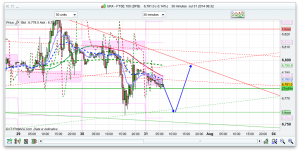Good morning. End of July already, doesn’t time fly! The 6767 area held as support fairly well ultimately reaching the 6800 before dropping off again, so gained a few points on the long trade from there. Initially the market reacted favourably to the further tapering announced last night, but has dropped back again overnight, 6780 as I write this. The bulls looked like they were going to break 6809 yesterday to push to the 6846 area yesterday but failed, though that level still remains as possible for today, mainly if 6758 holds. Argentina was declared in default yesterday by S&P as well.
Asia Overnight from Bloomberg
Asian stocks outside Japan fell, with Hong Kong’s Hang Seng Index retreating from a more-than three-year high, as Samsung Electronics Co. led information technology shares lower.
The MSCI Asia Pacific excluding Japan Index dropped 0.4 percent to 510.32 as of 11:53 a.m. in Hong Kong, paring its monthly advance to 3.3 percent. The MSCI Asia Pacific Index, which included Japan, slipped 0.1 percent to 149.33 after climbing 2.6 percent this month through yesterday, when it closed near the highest level since June 2008. It is poised for a third month of gains.
“‘The market is due for a slight pullback,’’ Desmond Chua, a strategist at CMC Markets in Singapore, said by phone. ‘‘There are concerns about geopolitical flare ups and the timing of U.S. interest-rate hikes as the Fed nears the end of quantitative easing.’’
Taiwan’s Taiex index declined 1.1 percent. The nation’s economy expanded 3.84 percent in the second quarter from a year earlier, preliminary figures from the statistics bureau released today showed. That compared with the median estimate for 3.2 percent by 26 economists in a Bloomberg survey.
Regional Gauges
South Korea’s Kospi index fell 0.4 percent after yesterday closing at the highest since August 2011. Hong Kong’s Hang Seng Index (HSI), which yesterday reached the highest since November 2010, slipped 0.1 percent, reversing an earlier gain of 0.7 percent. The FTSE Bursa Malaysia KLCI Index dropped 0.1 percent.
Japan’s Topix index climbed 0.3 percent after the yen weakened by the most in four months yesterday. Singapore’s Straits Times Index rose 0.8 percent and Australia’s S&P/ASX 200 Index gained 0.2 percent. New Zealand’s NZX 50 Index and China’s Shanghai Composite Index were little changed.
The MSCI Asia Pacific Index (MXAP) traded at 13.7 times estimated earnings yesterday compared with 16.5 for the Standard & Poor’s 500 Index, according to data compiled by Bloomberg.
Asian Earnings
Of the companies on the Asia-Pacific benchmark gauge that have posted results since the beginning of July and for which Bloomberg has estimates, 60 percent beat earnings expectations.
Futures on the S&P 500 fell 0.1 percent today. The U.S. benchmark index closed little changed yesterday as data showing better-than-forecast economic growth was offset by weaker earnings and the Fed’s decision to keep trimming asset purchases.
A Commerce Department report showed gross domestic product expanded at a 4 percent annualized pace in the second quarter, confirming the Fed’s view that a first-quarter contraction was transitory. The median forecast of 80 economists surveyed by Bloomberg called for a 3 percent expansion.
Policy makers tapered monthly bond buying to $25 billion in their sixth consecutive $10 billion cut, staying on pace to end the purchase program in October. Fed officials led by Chair Janet Yellen are stepping up a debate over when to raise interest rates for the first time since 2006 as unemployment falls faster than expected and inflation picks up toward their 2 percent goal.
The Fed said the labor market still has plenty of room for improvement, even after a surprising drop in unemployment.
Argentine Default
‘‘The U.S. economy is recovering and the Fed is still concerned about unemployment,” Kirk Hartman, Los Angeles-based chief investment officer at Wells Capital Management, where he helps oversee about $331 billion, told Bloomberg TV. “I don’t see inflation on the horizon, so there’s no real impetus for rates to increase any time soon.”
Standard & Poor’s declared Argentina in default on its foreign-currency obligations after the government missed a deadline for paying interest on $13 billion of restructured bonds. The South American country failed to get the $539 million payment to bondholders after a U.S. judge ruled that the money couldn’t be distributed unless a group of hedge funds holding defaulted debt also got paid.
FTSE Outlook

We are pretty much on todays pivot at 6782 as I write this, with it acting as resistance. If we drop off from here then next support is 6758, 6764 possibly (bottom of the 10 day Bianca channel), with 6733 below that – a level where it “should” bounce. 6807 is still resistance, with 6846 above that. The Bianca channels are showing slightly higher at 6857 and 6878 but I doubt it will reach that high today. I think it will struggle to break 6850. Initially today I think we will see a dip to that first support before a bounce back, though probably only to the top of the 30 minute channel you can see below.
